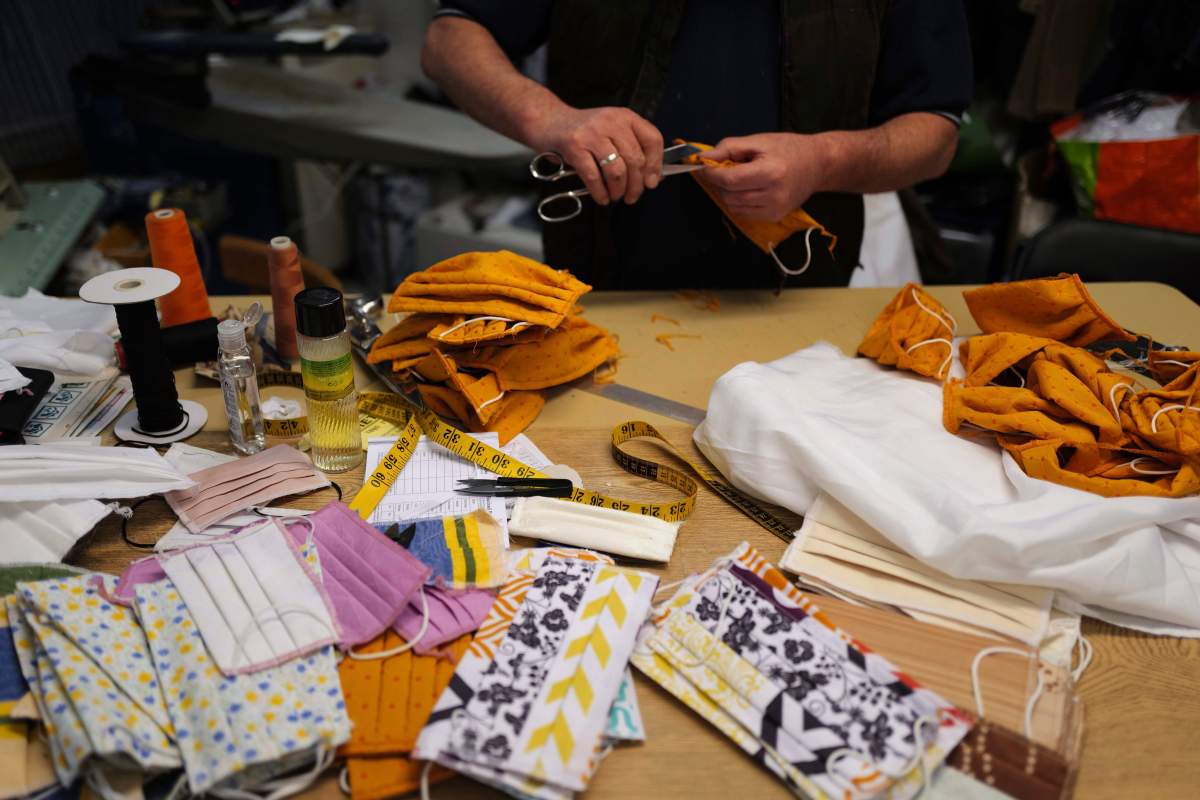A group of researchers who combed through a century of studies believes there is some evidence that cloth and cloth masks may reduce the transmission of the coronavirus.

Dr. Catherine Clase, associate professor of medicine at McMaster University and a nephrologist of St. Joseph’s Healthcare Hamilton, who was a part of an international opinion piece published in the Annals of Internal Medicine, says there are indications that cloth masks can block droplet and aerosol contamination in the environment.
“We identified some historic masks from the 1960s and 70s that blocked more than 90 per cent particles, which would be really amazing if we could produce that today,” said Clase.
Clase says the idea of tracking back to past reference papers and news stories to find evidence of the effectiveness of four-layer masks began in March.
A group of international epidemiologists hooked up with other physicians and PhD students involved in kidney research to scour journals in the hopes of creating an evidence summary on the effectiveness of cloth masks, according to Clase.
“I’m a kidney doctor, so we have dialysis patients who need chronic maintenance and dialysis,” Clase said, “And they have to come in for dialysis so they can’t practise physical distancing in the way that the rest of us do.”
Following the World Health Organization’s (WHO) COVID-19 pandemic declaration, health-care workers and hospitals across Canada became concerned over shortages of personal protective equipment (PPE) and medical-grade masks.
In March, the WHO estimated that just for medical needs, 89 million medical masks would be required worldwide to deal with the pandemic in a given month.
At the time, Clase and her colleagues became concerned that hospitals might conserve PPE exclusively for staff, leaving her patients without a source for proper PPE when coming in for treatments.

Clase says she and her international colleagues began looking at other options to minimize risk for dialysis patients considered to have an underlying condition, which could be devastating should they catch the virus.

Get daily National news
“We nephrologists and epidemiologists started looking at the evidence about cough masks and whether it blocks particles,” Clase said.
So far, the search has not yet uncovered any high-quality evidence that wearing a mask of any sort in a community setting reduces the transmission of viral diseases.
“So it’s a situation that we sometimes call absence of evidence. We say, you know, we have evidence that cloth can block particles, and then we have absence of evidence that that actually makes a difference to clinical outcomes,” Clase said.
In April, Canada’s chief public health officer Theresa Tam suggested material from cotton shirts, sheets or bandanas, and elastic bands could be used as an “additional measure” in situations where physical distancing is difficult to maintain.
However, Tam emphasized that wearing a mask — whether medical or non-medical — does not replace “fundamental” measures for curbing the spread of the virus, like staying two metres apart from people outside your household and washing your hands frequently.
Clase and her fellow researchers generally agreed with Tam’s assessment suggesting that masks made of three layers consisting of cotton, muslin and cotton flannel can provide some protection against airborne particles.
However, not all materials are alike and evidence from the opinion piece suggests that some knitted materials, like T-shirts, may not perform well.
“The thing about knitted materials like T-shirts is that when you make them into a mask, there’s a danger that they will stretch and then they won’t perform like you expect,” said Clase. “It’s because the whole size thing, the pore size is now bigger.”
Hamilton’s medical officer of health said she concurs with the evidence piece and agrees a well-constructed mask with at least two layers of tightly-woven fabric may be as effective as a surgical mask.
“It may be that it provides some protection from other people in that way. But the main job it does is to stop anybody who’s sick and doesn’t know it yet from spreading that virus to others,” said Dr. Elizabeth Richardson.
“We recommend them in situations where you can’t do that first thing that is really most important, which is the physical distancing.”
Clase says more research is needed into the best materials and design of cloth masks to help people wearing sewn masks in the community.
“Given the severity of this pandemic and the difficulty of control, we suggest that the possible benefit of a modest reduction in transmission likely outweighs the possibility of harm,” said Clase.
Questions about COVID-19? Here are some things you need to know:
Symptoms can include fever, cough and difficulty breathing — very similar to a cold or flu. Some people can develop a more severe illness. People most at risk of this include older adults and people with severe chronic medical conditions like heart, lung or kidney disease. If you develop symptoms, contact public health authorities.
To prevent the virus from spreading, experts recommend frequent handwashing and coughing into your sleeve. They also recommend minimizing contact with others, staying home as much as possible and maintaining a distance of two metres from other people if you go out. In situations where you can’t keep a safe distance from others, public health officials recommend the use of a non-medical face mask or covering to prevent spreading the respiratory droplets that can carry the virus.
For full COVID-19 coverage from Global News, click here.










Comments